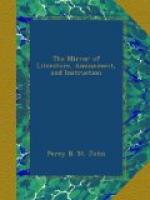* * * * *
STANZAS ON REVISITING LUDLOW CASTLE.
Pale ruin! once more as I gaze on thy
walls,
What memories of old, the sad vision recalls,
For change o’er thee
lightly has past;
Yet what hearts are estrang’d and
what bright hopes are fled,
And friends I erst dwelt with now sleep
with the dead,
Since in childhood I gazed
on thee last!
Thine image still rests on the clear stream
beneath,
And flow’rs as of yore, thy old
battlement wreathe,
Like rare friends by adversity’s
side;
Still clinging aloft, the wild tree I
behold
That marks in derision, the spot, where
of old
The standard once floated
in pride.
But the conqueror, Time, hath thy banner
o’erthrown,
And crumbled to ruin the courtyards that
shone
With chivalry’s gorgeous
array;
And where music, and laughter so often
have rung,
In thy tapestried halls, now the ivy hath
flung
A mantle to hide their decay.
Through the hush of thy lone haunts I
wander again,
Where these time-hallow’d relics,
familiar remain,
As if charmed into magic repose;
The pass subterraneous,—the
fathomless well,
The mound whence the violet peeps—and
the cell
Where the fox-glove in solitude
grows.
In the last rays of sunset thy grey turrets
gleam,
Yet I linger with thee—as to
muse o’er a dream,
That mournful truths soon
will dispel;
My pathway winds onward—life’s
cares to renew,
And I feel, as thy towers now fade from
my view,
’Tis for over—I bid thee
farewell!
E.L.J.
* * * * *
THE NOVELIST.
* * * * *
THE HUNTSMAN.
A Traditionary Tale: by Miss M.L. Beevor.
“The merciful man is merciful to
his beast.”
“The worm we tread upon will turn
again.”
Charles, the chief huntsman of Baron Mortimer, was undeniably a very handsome young man, the beau ideal of the lover, as pictured by the glowing imagination of maidens, and the beau real of a dozen villages in the vicinity of Mortimer Castle. Yet, was his beauty not amiable, but rather calculated to inspire terror and distrust, than affection and confidence: in fact, a bandit may be uncommonly handsome; but, by the fierce, haughty character of his countenance, the fire which flashes from his eyes, and the contempt which curls his mustachoed lip, create fear, instead of winning regard, and this was the case with Charles. One, however, of those maidens, unto whom it was the folly and vanity of his youth to pay general court, conceived for him a passion deep and pure, which in semblance, at least, he returned; but how far to answer his own nefarious purposes, for Charles Elliott was a godless young man, we shall hereafter discover.




